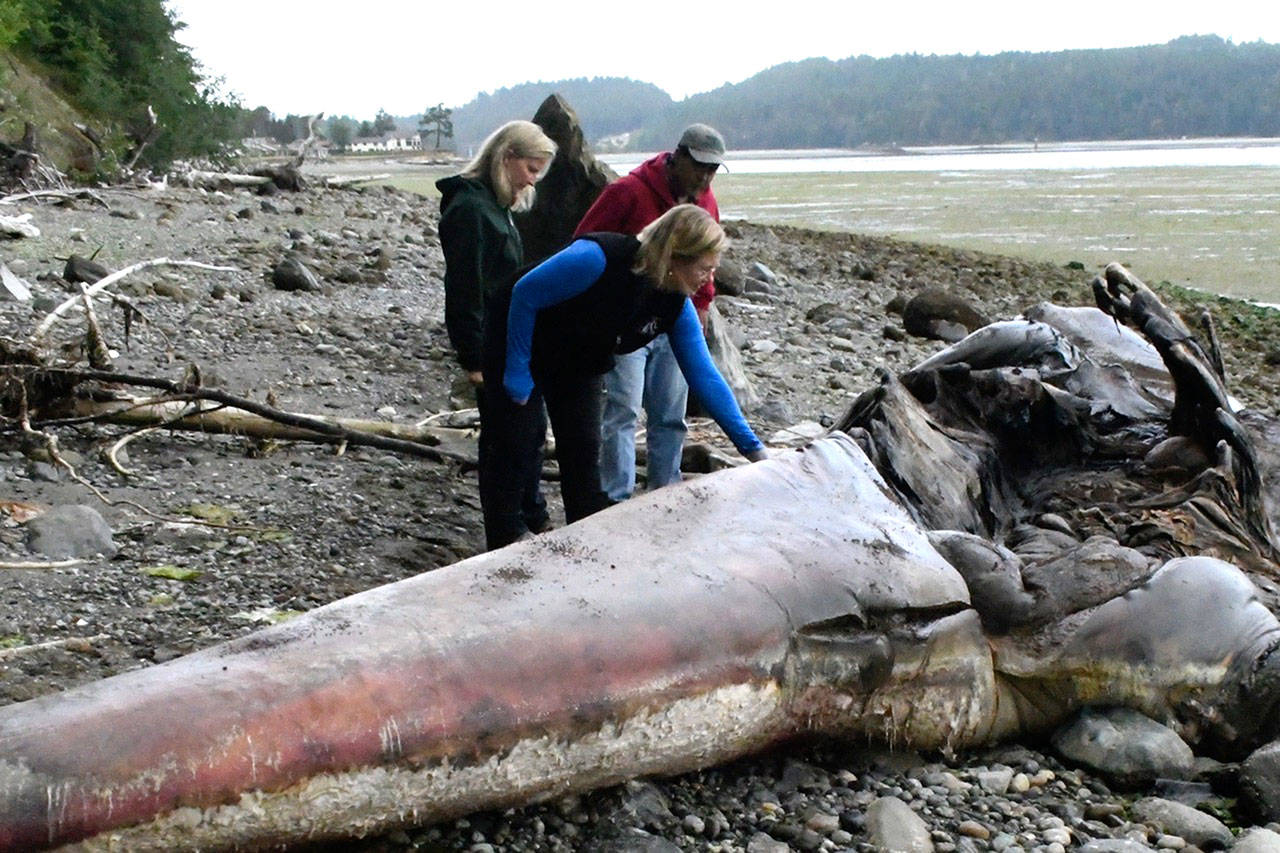PORT HADLOCK — A living laboratory has been established on the Oak Bay beachfront property of veterinarian Stefanie Warwag and her husband, Mario Rivera, thanks to their shared interest in marine science and marine mammals.
On March 27, a dead 40-foot male gray whale was reported floating off Marrowstone Island.
On May 28, the body drifted to a residential area at Olele Point in Port Ludlow and was beached.
It was the 28th gray whale discovered dead this year in Washington state.
As of June 13, two others — one in Grays Harbor and another in Long Beach — have died, bringing the total to 30. In the entire U.S., the number is 77. When adding Canada and Mexico, the number jumps to 155.
That’s a small fraction of the total number of gray whales believed to have died this year, because most simply sink and others wash up in such remote areas they’re not recorded.
Many — including the whale now at the Port Hadlock beach — have been starved, experts have said.
The surprised property owners at Odele Point in Port Ludlow called about the whale beached on their land to the National Oceanic and Atmospheric Administration (NOAA).
That agency contacted the Port Townsend Marine Science Center and its Marine Mammal Stranding Network because the event occurred in the marine science center’s network’s zone.
Network members kept vigil with the whale’s body for several days, awaiting the proper tides for moving the 45-ton whale.
Warwag and Rivera, both network members, assisted with the whale’s corpse at Olele Point. Told of a need for a location to perform a necropsy on the whale and a place for it to decompose and be studied, the couple immediately offered their beach.
“This is amazing opportunity for a veterinarian,” said Rivera, adding that his wife was excited to be part of the process.
It took a few more days for the tides to be favorable, but on June 2 the mammal was towed slowly about 3 miles to the couple’s beach.
Jessie Huggins of Cascadia Research Collective and Casey Mclwan of SR2 performed the necropsy the next day. They were assisted by Warwag and staff and volunteers of the Port Townsend Marine Science Center.
“As part of the reason I got involved with the Marine Science Center was to learn more about marine mammals,” Warwag said.
“I assisted in the necropsy and it is similar to dogs and cats, but the size makes it so much harder.”
Betsy Carlson, citizen science coordinator with the Port Townsend Marine Science Center, said the whale was skinny.
“The whale was emaciated, without signs of trauma,” she said.
The numbers of dead whales that have been found dead this year is the most since a die-off in 1999-2000.
“We know they are all coming in malnourished,” Carlson said. “This happened before but scientists can’t make any correlations at this time.”
A small plastic bag and a tiny piece of plastic were found in the whale’s stomach. Gray whales are baleen whales, which sieve their food from the bottom of the ocean.
Warwag and Rivera put lime on the mammal to cut the odor. It can’t be detected from their home, which is located on a bluff high above the animal. The lime also seems to have slowed wildlife making a meal of the whale as it slowly decomposes.
Carlson said there is an upside to the death.
“The nutrients from this guy are going to be really valuable to all marine life for a long time,” she said.
“This area is where there are clams and oyster harvesting and crabbing takes place. Whale fall creates an ecosystem that supplies nutrients for smaller organisms that feed from the bottom. That in turn will help the shellfish and crab fishery.”
News outlets around the world have reported on the whale at Port Hadlock. Warwag and Rivera have been interviewed by reporters on different continents.
They are puzzled as to why this story is so interesting to so many but are happy to encourage others to pay attention to marine life, the sea and the environment.
Carlson said the exposure has garnered one additional drop-off site for consideration in Puget Sound, bringing the number to 15.
Warwag and Rivera said they would welcome a second whale if the opportunity allows.
Landowners wishing to offer their beaches for decomposing whales can contact Michael Milstein at NOAA, 503-231-6268 or email michael.milstein@noaa.gov.
________
Jefferson County Reporter Jeannie McMacken can be reached at 360-385-2335 or at jmcmacken@peninsuladailynews.com.

